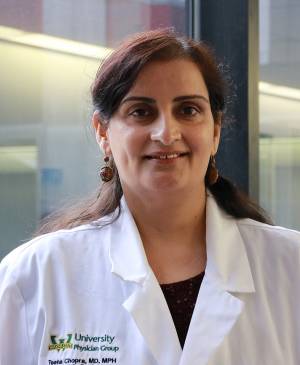Teena Chopra, M.D., M.P.H., professor of Medicine, Division of Infectious Disease, for the Wayne State University School of Medicine and co-director of Wayne State University’s Center for Emerging and Infectious Diseases, is piloting a program that will educate Detroit’s youth on the significance and history of vaccines.

The two-year program, supported by a $60,000 grant from the DMC Foundation, will see the education of Detroit’s high school students during the summer months to become ambassadors for promoting vaccines. The ambassadors will represent the program in their schools and educate their peers on the history and benefits of vaccines, and how vaccinations are effective in protecting communities. A group of 30 ambassadors will present the information using easy-to-understand PowerPoint presentations, posters and hands-on demonstrations. The ambassadors will aim to reach 2,000 Detroit students.
“This is an incredible opportunity for Detroit youth who will be empowered to serve as Vaccine Ambassadors for the city. They will gain insight into the history of vaccines and will be trained on their communication skills,” said Dr. Chopra, who also serves as corporate medical director of Infection Prevention, Epidemiology and Antibiotic Stewardship for WSU and the Detroit Medical Center. “Our ultimate goal is to improve vaccination rates amongst the Detroit youth. We are so grateful to Detroit Public Schools Community District for partnering with us on this unique project.”
The project will also involve WSU medical students, she said. The Infectious Diseases Interest Group at the School of Medicine will serve as trainers for the project.
Dr Chopra is collaborating with Mathew Seeger, Ph.D., a WSU professor of Communication and co-leader of the Center for Emerging and Infectious Diseases, on the grant.
“We hope to help high school students become more informed about the importance of vaccinations so that they can help inform others,” Dr. Seeger said. “Unfortunately, there is much misinformation and many rumors. Arming students with facts from credible sources is one way to help communicate the real story of the importance of vaccines.”